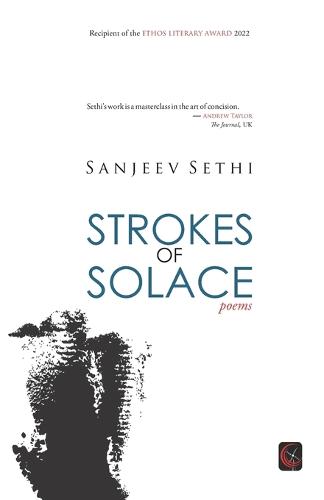
The title of Sanjeev Sethi’s sixth book of poetry, Strokes of Solace, proclaims a promise. And Sethi delivers, singing the universal human comedy from a personal vantage point while sprinkling seasoned balms along the way.
The collection is a quest for healing, and entails as the poet’s rites of passage an acknowledgement of inner turmoil, seeking help from within and without, often empathising with others, and ultimately turning inward for solace.
‘Transcendence’, the opening poem, shows Sethi at odds with himself and with the world at large: “I stutter: scream. / I speak to no one. / Not even myself”. In his quest to comfort the self, he looks for assurances within: “Sadness does this. / It pulls you to its entrails, / … until another phase snaps / you out of it” (‘Fluctuations’); “We must write the most laudatory validations, / … No-one else / is impatient to ratify our résumé” (‘Pointers’); “I negate the truths they tell me / about myself” (‘Personalia’); “In this microcosm / packed with people / I’m graded / to be my walking stick” (‘Miniator’).
When gazing inward does not seem enough, Sethi derives gratification outside. In ‘Wishers’, he is counting on virtual reunions with relations: “In / sleety climes, this will quieten me”. In ‘Stubs’, he hails distance as the closest observer: “In some ways, only strangers know us”. ‘Snips’ has him turning to nature for answers: “Rain helps / answering / unanswered questions”. Elsewhere, the poet seeks deliverance in being a good samaritan: “I acquaint my maid’s son of my readiness / to underwrite the procedure. Her eyes sign / her thank-you note” (‘Silence’); or operating out of thoughtful empathy: “On his forty-fourth, I am the first / ever to wish him, not his mate, / not his mother, nor his son or siblings” (‘Marginalia’).
There are times when neither introspection nor wishful thinking suffices: “That is the trouble / with speculative spurs / they never slake” (‘Book’). Turning from failed reassurances of his own device, Sethi relies on the almighty, proclaiming out loud: “I draw on His omneity / to hush the house. / … I seek Him / in my lowest hour” (‘Supplication’); sometimes advertising in hushed tones: “My / faith requires no visa. It carries me / sans authentication” (‘Meta’); while priding himself in keeping his faith a private affair: “But my God / isn’t for display. / He is not / a fill-in for fripperies. / There is no deity / on my draperies” (‘Privities’).
Kurt Vonnegut, in his religio-political satire Cat’s Cradle (1963), advocates “foma” (a self-coinage meaning “comforting untruths”) as means to soothe a soul out of grim realities into a state of beatific ignorance. Sethi needs no falsities; he consoles with truthful wisdom acquired and incubated in a receptive mind over six decades, as evidenced in tastefully enacted lesson-poems such as ‘Distich’, ‘Snips’, ‘Tern’ and ‘Stubs’, despite playful allegations of his being cryptic to the seeker: “Why do you shade your inner shrine?” (‘Relay’).
‘June 2022’, the final poem in the collection, sees Sethi come full circle as he opts an ingress and settles within as the ruler of his inner empire: “A few slots from sixty / I ought to be an adult. I will bill / and coo with the windmills in my / inmost and position myself as my / own éminence grise”. The mention of windmills heralds quixotic comparisons. Sethi’s proclamation, however, is anti-quixotic in that unlike the delusional self-styled knight it alludes to, the poet is sane enough to put his inner voices to purposes medicinal to the soul and psyche. The collection, thus, works as an exercise in exorcism, cathartic to the reader as much as it is to the poet who wrote it.
To Sanjeev Sethi, English being a non-native tongue poses no barrier. The language is an extension of his self, for it appears that he thinks in English, always draping his ideas in the fittest attire and never gasping for whatchamacallits nor making do with makeshifts. In his transmission, there is no translation; hence no attenuation. Sethi is religiously particular about his choice and count of words; economy and precision the tools of his poetic genius. In a telephonic conversation he states that not a single word, line break, enjambment or punctuation is set without purpose.
Strokes of Solace is healing gourmet, a multilayered salad that isn’t a task for taste buds. To the literary diner, Sanjeev Sethi is a granny and a Michelin-starred chef yoked together, albeit organically. In his words: “There is comfort in calories” (‘Nimieties’). It won’t be surmising to say that Sethi’s calories have nutrition as an add-on.
